Working in Communities
Working in communities
TO OVERCOME HEALTH DISPARITIES
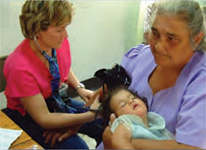
Drs. Sian Curtis and Gustavo Angeles (maternal and child health) lead the MEASURE (Monitoring and Evaluation to Assess and Use Results) project, assisting some 30 countries with collection and use of health data. MEASURE recently received a record $181 million grant from the U.S. Agency for International Development to fund monitoring and evaluation of family planning, maternal and child health, nutrition and HIV/AIDS programs.
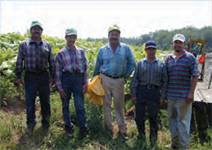
The Collaborative Studies Coordinating Center (CSCC) has studied cardiovascular disease since its founding in 1971. A landmark study in the 1980s showed the relationship of cholesterol to heart disease. A current initiative, the largest health study of Hispanics in the U.S., is led by Drs. Lloyd Chambless and Lisa LaVange (biostatistics) and Dr. Gerardo Heiss (epidemiology).
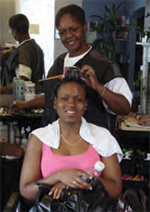
Dr. Laura Linnan (health behavior and health education) and Dr. Robert Millikan (epidemiology) are among those who study cancer disparities. Linnan’s BEAUTY project disseminates information about cancer through beauty shops. Millikan seeks to improve access to information, diagnostic screening and clinical trials for young black women, who are more likely to die from basal-like breast tumors.
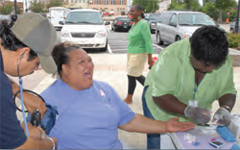
HOPE WORKS, led by Dr. Marci Campbell (nutrition), is a community-based strategy to support and educate women to reduce obesity and lead healthier lives.
Working in communities
PREPARING TO MEET PRESSING PUBLIC HEALTH NEEDS
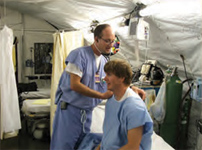
Just after Hurricane Katrina, a fundraiser at the School raised nearly $13,000 for American Red Cross relief efforts. Some volunteers, like Dr. Richard Vinroot (shown here), volunteered at temporary clinics immediately following the disaster. Others have spent subsequent spring, summer and winter breaks helping repair and rebuild in the hard-hit Gulf Coast areas.
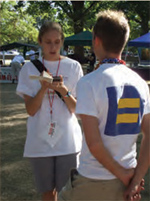
The N.C. Center for Public Health Preparedness (NCPHP) works to coordinate the public and private sectors in emergency preparation efforts, including planning and providing information about pandemic flu. The Center-sponsored Team Epi-Aid gives student volunteers a chance to gain applied experience, while providing local and state health departments with emergency responders.
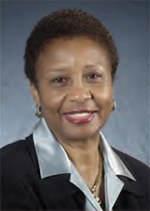
An ongoing intervention designed and conducted by Dr. Peggye Dilworth-Anderson (health policy and management) provides crucial education and support to caregivers of poor, rural and medically underserved elders in North Carolina, particularly elders with Alzheimer’s disease.
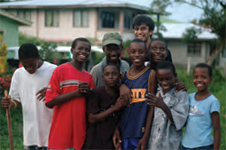
Student volunteer efforts are central to the School’s presence in North Carolina and around the world. Here, recent public health student Naman Shah poses with youngsters in Guyana, where Shah initiated a study to establish genetic markers for the resistance of an anti-malarial drug.

 Dental Health
Dental Health





